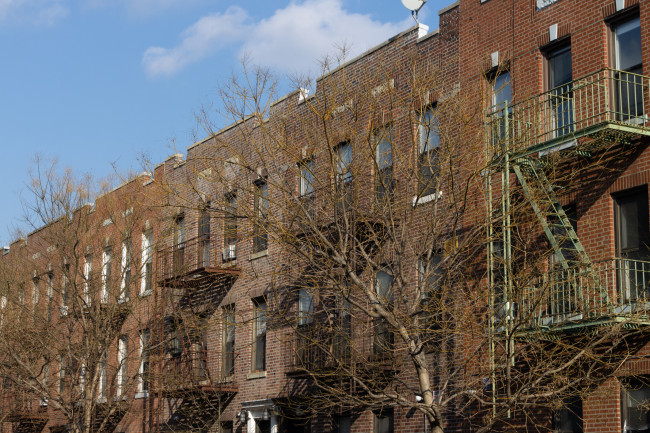Elaborate apartment scams on Instagram can cost renters thousands—along with their pride
- A renter in Flatbush was scammed out of $1,000 for a dubious deposit on an apartment
- Brokers say con artists impersonate agents, agencies, and forge real estate licenses
- If you are asked to pay any amount before seeing an apartment consider it a huge red flag

Does that gorgeous apartment on Instagram look too good to be true? Watch out: it might be a scam.
iStock
Emily rents an apartment in Flatbush, Brooklyn, on a month-to-month lease, and like many New Yorkers, she’s always looking for the next best thing. This year, she thought she found it: a cheap apartment in Midtown East listed on Instagram, of all places.
But instead of starting a new chapter in Manhattan, Emily ended up losing $1,000 to a scammer. And she’s not alone. There’s a different kind of catfish afoot in New York City, and these fraudsters aren’t feigning hot dates, but a new place to live.
“It was frustrating, disheartening, a little embarrassing,” Emily said. “I wanted so badly for the apartment to be legitimate.”
Emily spoke to Brick Underground using a pseudonym because, frankly, she was self-conscious that she had gotten scammed. She said she felt “foolish” and that her experience left her “jaded” about her apartment search.
Her feeling isn’t surprising—getting tricked is embarrassing, and admitting it can incur a lot of humiliation. (Take the Cut’s financial editor for example, who was scammed out of $50,000 and torn apart by online commentators.) But Emily shouldn’t be embarrassed—nor should you.
In an era of TikTok apartment influencers and Instagramable real estate listings, it's no wonder fraudsters have taken to social media to target unsuspecting renters. But what is shocking is how sophisticated some of these scams have become.
Brick Underground spoke to six agents who said scammers have impersonated them or their firms on Instagram, even going as far as to forge legal documents: real estate licenses, New York ID cards, and more. Read on for their stories.
[Editor’s Note: Have you been the victim of a rental apartment scam on social media? Drop us a line. We respect all requests for anonymity.]
Scams cost tenants hundreds, even thousands of dollars
Rental apartment scams can cost tenants hundreds or thousands of dollars, and these individual thefts add up. Last year, 537 victims lost $5.7 million to investment and rental real estate scams in New York state, according to data from the Federal Bureau of Investigation.
Those losses are lower than the $8.7 million 614 victims forfeited in 2019, and follow an even bigger spike in scams in 2020, according to FBI data. And not every broker has seen online Instagram scams. Gary Malin, chief operating officer at the Corcoran Group, said he wasn’t surprised by the online scams but that he hadn’t personally encountered them.
It’s also unclear how many scams take place in NYC, given that the FBI and Federal Trade Commission both keep data at the state level. But local numbers are low.
The Department of State’s Division of Consumer Protection, which refers scam reports to the FBI and the FTC received only 65 complaints from residents of NYC or against companies within NYC in the past three years, per a spokesperson. The Office of the New York State Attorney General has received just 25 since 2021, according to a spokesperson.
Still, real estate scams are on the rise nationwide, and many cases of fraud may go unreported. Con artists often target the most vulnerable—those desperately in need of a new apartment—and may grow worse in the summer’s hot rental market, Malin said.
“I do think that these scams happen a little more often during the summer months in the city because of the intensity of searching for an apartment,” Malin said. “These people prey on people’s fears about securing something within a very limited time frame.”
| How to report a rental apartment scam | |
|---|---|
| FBI | Use the FBI’s Internet Crime Complaint Center to make a complaint. |
| FTC | Use the FTC’s Report Fraud website. |
| State Attorney General | The AG’s website offers several complaint options by the type of an issue. |
| NYPD | Call 911 or go to a local precinct or office. |
Fraudsters impersonate agents
Instagram scammers aren’t just posting fake listings anymore—they’re impersonating real, working agents.
Sarah Saltzberg, the co-founder of Bohemia Realty Group, remembered feeling shocked when a friend she hadn’t spoken with for years sent her an Instagram account using her name and face. It was a scammer who used her photos, Instagram posts, and false contact information to create a fake account last year, Saltzberg said.
“You feel so vulnerable,” she said. In a rage, she messaged the account and demanded they take it down. “And then immediately, I was blocked.”
Saltzberg wasn’t alone. Randy Baruh, an agent with Compass, said he had a scammer impersonate him last year—even using photos of his children to make the fake account more realistic. Douglas Wagner, director of brokerage services at BOND New York, said maybe a dozen of his agents have been impersonated by online scammers—some more than once.
And some scammers have taken this copycat con to a new level.
Saltzberg recounted how scammers would create false “certificates of achievement” with Bohemia’s letterhead, fake business cards, and even a falsified real estate license from the DOS. Images reviewed by Brick Underground show the names and images of current and former Bohemia agents edited onto business cards with false contact information.
Scammers that impersonate real people are harder to spot. A renter can look up a broker’s license number with the DOS to confirm they are a legitimate agent. But if a scammer gives you a real agent’s name, that search will show a real license number.
“Anybody verifying that this is a legitimate person, unless they were really digging deep, wouldn’t necessarily think about it,” Saltzberg said.
Similarly, Yan Gladkov, an agent with Keller Williams NYC, said a fake account posted his Instagram photos, matched his number of followers, and copied his name—though the account spelled it slightly differently to avoid detection. The account had blocked Gladkov, but a colleague gave him a heads up after the scammer encouraged that colleague to invest in “the crypto sector,” Gladkov said in an email.
“I literally could not fall asleep. I was messaging people and asking people to take care of it,” Gladkov said. “I’d make a strong suggestion for others not to take this lightly.”
A huge red flag: Asking for money to tour an apartment
Josiah Hyatt, an agent at Keller Williams NYC, was first introduced to the world of apartment scams when a renter showed up at his office about two years ago. They claimed they had rented an apartment, handed over the first month’s rent and a security deposit, and showed up to move in, only to have the super turn them away. Since that scam, Hyatt said things have only gotten worse.
About “once a month, someone from our team is being impersonated,” Hyatt said. Or, a scammer will create a fake person and claim they work with Hyatt on his team at Keller Williams NYC, the Skyward Team.
If a scammer can’t get you to hand over thousands of dollars in rent, they’ll go for a smaller target: application fees. These fees are capped at $20 in New York (unless you're renting in a condo or co-op) and should only be paid after you’ve seen an apartment to the brokerage, not to any agent’s personal account, said Keller Williams NYC's Fanny Montalvo, the firm's broker who handles compliance.
“We never, ever, accept Zelle—all payments must be made to us directly,” Montalvo said. “We do not accept or ask for good faith deposits to either view or reserve an apartment. It is prohibited in New York.”
But certain renters—those that are desperate, or unaware of the law—are often vulnerable to this type of theft. Brick Underground spent a week talking to possible scammers on Instagram. All of them asked for a $100 “refundable” application fee to be sent over Zelle or Cashapp.

How to take down an Instagram imposter
Montalvo, for her part, said Keller Williams NYC has embedded a pop-up notification on its website warning customers about scams and linking to the DOS alert and advises agents never to send out photographs of their licenses, which could be copied and edited. Baruh reported his imposter to Meta, and Saltzberg said she contacted both Meta and the DOS. Brian Hourigan, a senior managing director at BOND New York, said he’s referred victims to the NYPD in the past.
But many brokers expressed frustration with both Meta and the government agencies that handle scams and regulate the real estate industry. Both Compass’s Baruh and Bohemia’s Saltzberg said Meta wouldn’t respond to her requests to take down false accounts until they started paying for verification.
“Now, since I have a blue tick and I’ve paid for it, they do an ‘investigation’ and the account does end up getting shut down,” Baruh said. “But that’s after I started paying for it.”
Meta’s Business Plus package—for $44.99 a month—promises benefits that can “get issues resolved more quickly,” according to its website. The company did not respond to a request for comment from Brick Underground.
Saltzberg said it seemed like the DOS “didn’t care or didn’t have the manpower” to address the issue. Both Hyatt and Saltzberg said they attempted to file police reports, but because they weren’t the ones who had their money stolen, they couldn’t do so.
“It was very frustrating,” Saltzberg said. “We should’ve been able to file a report because it damaged our reputation, I’m sure.”
Wagner and Hourigan both wished that there was a hotline for consumers to report these problems. Currently, consumers who want to report online scams have a lot of options: there’s several agencies where a victim of an online scam could make a complaint.
For example, the NYPD advises victims to call 911 or make a report at a precinct, according to a spokesperson. Consumers can also report fraud to the FBI’s Internet Crime Complaint Center or the FTC—where the DOS’s Division of Consumer Protection refers complaints. (An FTC spokesperson recommended that victims do report scams to the agency.)
Victims can also complain to the Office of the New York State Attorney General, which last month warned New Yorkers about online romance scams.
While it’s a confusing network of city, state, and federal agencies, you should absolutely report a scam. These reports demonstrate how common these online imposters actually are. Reporting could also help remove the stigma people like Emily face, spreading awareness so the next renter to face an online scammer gets to keep their cash.




























